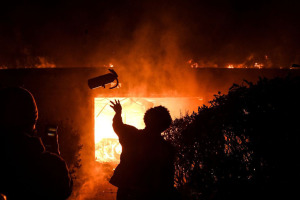The church must become a trusted, safe sanctuary for victims of abuse

Domestic violence is one of the most committed, least reported crimes in the U.S. The Christian Post’s, Brandon Showalter, did a great job a couple of weeks ago exposing how the Church has been less than responsive to survivors of domestic violence in his article, “Spouses suffering abuse find empowerment to leave destructive marriages in secret online groups.”
Lack of understanding has been at the heart of a failed response by our communities to protect survivors and their children.
I am no stranger to domestic violence. I grew up in a home with a father who was a police officer and a mother who worked in the local prosecutor’s office. I did not witness violence in my home, but I did witness my parent’s response to women in crisis needing to flee their homes, and on occasion taking up residence in our home until my parents could find safe shelter for them.
Later, as a police officer myself, I had taken an oath to protect and serve but felt like I spent most of my time responding and solving crimes that happened. I was not protecting anyone.
But in 1994, I joined a group of police officers with the Nashville Metropolitan Police Department and formed what became the largest law enforcement-based domestic violence intervention program in the U.S. We had a pandemic of interpersonal homicides, averaging 25 women and children killed each year in the city at the hands of a family or household member.
The data suggested that preventing domestic violence was realistic but required a paradigm shift. It required comprehensive training and a commitment from the entire community to hold abusers accountable. And it also involved understanding the victim’s trauma — the fear that they or their children would be harmed or killed if they didn’t comply with their abuser.
If we are lucky, only 1 out of 2 survivors of domestic violence will tell anyone what is happening. Why? Because they do not trust that the criminal justice system, workplace, or church will be responsive to them — to help them or keep them safe.
The church must step up and intervene on behalf of the domestic violence victim in their congregation or in their community. They must be a safe space where the victim knows that they will be heard, understood, and given the life-saving resources needed to be safe and protected.
What can the Church do specifically?
First, we need to realize that prayer is active — that God often uses us to answer someone’s prayer for help. In other words, the Churches’ response to the victim may be God’s answer to prayer.
Second, we must tell survivors that it is not their fault — that they didn’t do anything to cause the abuse inflicted on them. But to do that, we in the Church must believe that ourselves. We have cultural belief systems in place that can in conflict with this truth. Some of us might think that if she would just be more responsive to her husband, make sure dinner was on the table, not speak her mind, then the violence would go away.
I have told tens of thousands of people across the globe that unless they were raised in a home filled with abuse or had been abused in a relationship, then they need to check their view of what is “normal” at the door. Nothing that is happening in this relationship will make any sense if you filter it through your sense of normal or your personal interpretation of Scripture. In fact, too often, people will side with the abuser and their “version” of the story.
Abusers are believable. Why? Because they are master manipulators, and to be good at manipulating you need to be a very good communicator.
We need to reconcile the truth that nobody is justified in using violence or emotional abuse on anyone at any time. Until we believe that and hold to that truth, we instead focus on holding survivors accountable and not abusers.
Third, we need to understand why the survivor (who has not fled the home) is often the biggest defender of the abuser. The victim often defends the abuser only out of self-preservation.
The number one reason a survivor stays with the abuser is because of fear of violence. And this is well founded considering 75% of domestic violence murders occur during or after the survivor has left the home. So, telling them to just leave, like our culture often does, is deflating. The victim knows how dangerous it will be to leave. She has been told, over and over again, “You leave, and I will kill you.” Or the abuser will threaten to kill the kids or her family. And they will.
Either way, the victim is stuck between a rock and a hard place. Our culture ignorantly tells the victim to leave while our churches ignorantly tell them to stay.
As Christians, we need to understand that loving our neighbor means caring about the survivor and/or children in a domestic violence situation, and that leaving that environment is the end goal for their health and safety. Very sophisticated and effective abusers may rarely use physical violence. The threat of violence has been established. Now they focus on maintaining power and control through emotional abuse. “Who would believe you?” “Who would want you?” Abusers break their victims down emotionally as well as physically.
I have worked with survivors throughout the U.S. and many of them talk about “the look.” When in a crowded room, at church, or a holiday party, the abuser can look at them from across the room and instill fear. The look speaks loudly to what will happen when they leave.
Finally, the Church needs to understand the risk that domestic violence can have on the congregation. Domestic violence is the leading cause of workplace violence. Once a survivor has made the decision to leave and seeks shelter, the abuser starts to stalk. And a church service can be the perfect opportunity for the abuser to attack the ex-partner, or to kidnap the kids from the children’s ministry.
Sadly, during the pandemic we have seen huge increases in domestic violence homicides, as much as 160%, as well as calls to crisis hot-lines.
It is in the best interest of the Church — and its security teams — to understand domestic violence so we can become a sanctuary. By doing this, it will lead to healthier homes and healthier communities.
But it all starts with trust. And the Church must extend its arms. Jesus has created the perfect model.
A former detective with the Metro Nashville Police Department, Mike McCarty has dedicated more than 30 years to violence prevention. He is regarded as one of the nation’s leading experts on violence prevention and has consulted with the U.S. Department of Homeland Security, Department of Defense and Justice Department. A devout man of faith, McCarty is CEO of Safe Hiring Solutions and its affiliated company, SafeMinistry Solutions, www.safehiringsolutions.com. He is also the host of The Safety Zone podcast.



























